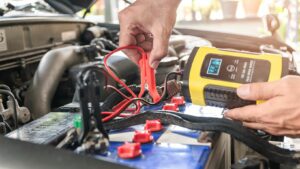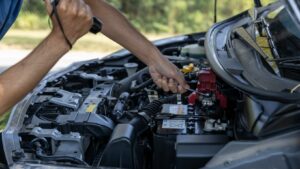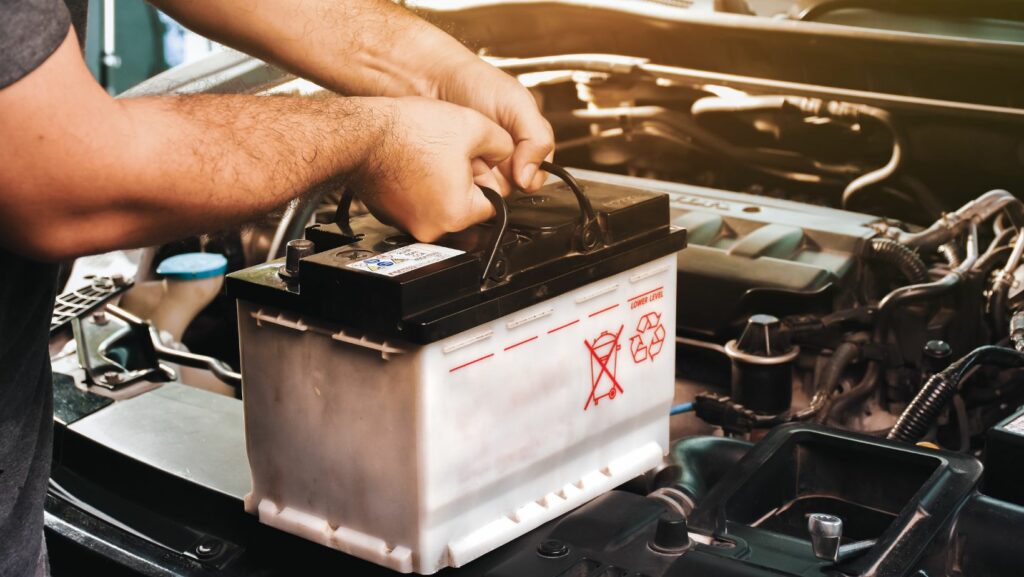Car Battery Maintenance
- Car Battery Maintenance Importance: Regular maintenance is essential for vehicle reliability, helping to prevent breakdowns and extending battery lifespan by up to 30%.
- Signs of Battery Issues: Early detection of problems is crucial. Key indicators include decreased cranking power, dashboard warning lights, dim headlights, corroded terminals, and unusual smells.
- Regular Inspections and Cleaning: Conduct inspections every three months, checking for corrosion and loose connections. Clean terminals to maintain electrical flow and prevent issues.
- Fluid Level Monitoring: For batteries that require it, ensure electrolyte fluid levels are adequate, topping off with distilled water as needed to maintain efficiency.
- Seasonal Care Practices: Prepare batteries for seasonal changes by checking health before winter and monitoring fluid levels in summer to prevent damage from temperature extremes.
- Avoid Short Trips and Deep Discharges: Limit short trips to allow full charging of the battery and avoid depleting it below 50% to significantly enhance battery longevity.
A car battery is the heart of any vehicle, powering everything from the engine to the electronics. Yet many drivers overlook the importance of proper battery maintenance, leading to unexpected breakdowns and costly replacements. Understanding how to care for a car battery can save time, money, and frustration.
Regular maintenance not only extends the life of the battery but also ensures optimal performance. Simple tasks like checking connections, cleaning terminals, and monitoring fluid levels can make a significant difference. By implementing these straightforward practices, drivers can enjoy peace of mind and a reliable ride.
Importance Of Car Battery Maintenance

Car battery maintenance plays a vital role in vehicle reliability and longevity. Regular upkeep prevents breakdowns by ensuring the battery operates efficiently. Recognizing symptoms of battery issues early on can save drivers from costly repairs.
Proper maintenance extends battery life significantly. According to the Battery Council International, regular checks can increase a battery’s lifespan by up to 30%. Routine inspections, including examining battery connections and terminals, verify that they are tight and corrosion-free.
Monitoring fluid levels also contributes to optimal performance. The electrolyte level should remain consistent; low levels can disrupt normal function. Ensuring top-off with distilled water prevents damage and enhances battery efficiency.
Incorporating frequent maintenance checks into a vehicle’s routine enhances overall car performance. Drivers should schedule assessments every three months, especially before extreme weather conditions. This proactive approach leads to peace of mind and dependable transportation.
Common Car Battery Issues
Car batteries can face several issues that affect their performance and longevity. Recognizing these problems early can prevent unexpected breakdowns and costly repairs.
Signs Of A Weak Battery
- Decreased Cranking Power: A weak battery struggles to start the engine, indicated by slow cranking noises.
- Dashboard Warning Lights: A battery warning light on the dashboard signifies potential battery issues or charging system failures.
- Dim Headlights: Dimming or flickering headlights, especially when idling, often points to insufficient battery power.
- Corroded Terminals: Green or white residue on battery terminals suggests corrosion, which can hinder electrical flow.
- Unusual Smells: A strong rotten-egg odor may indicate a leaking battery, signaling the need for immediate inspection.
- Temperature Extremes: High heat and severe cold can accelerate battery wear, reducing overall lifespan.
- Frequent Short Trips: Regularly short drives prevent the battery from fully charging, contributing to a weakened state over time.
- Electrical Load: Excessive use of electronic components, such as infotainment systems and interior lights, drains the battery.
- Age of the Battery: Batteries typically last between 3 to 5 years. Age contributes significantly to decreased performance and reliability.
- Poor Maintenance: Lack of regular checks, such as terminal cleanliness and electrolyte levels, can lead to premature battery failure.
Tips For Proper Car Battery Maintenance
Proper car battery maintenance ensures reliability and longevity. Implementing these tips helps drivers extend battery life and improve vehicle performance.
Regular Inspection
Conduct inspections every three months. Drivers should check for corrosion, loose connections, and signs of wear. Inspect the battery case for cracks or leaks. Monitoring the battery’s condition helps catch issues before they lead to breakdowns.
Cleaning Terminals
Clean battery terminals regularly. Use a mixture of baking soda and water to neutralize corrosion. Disconnect the battery cables, starting with the negative terminal. Scrub the terminals and cable ends with a brush, then rinse with water. Reattach the cables, ensuring a snug fit to prevent future corrosion.
Checking Fluid Levels
Monitor electrolyte fluid levels in batteries that require it. Open the battery caps to inspect the fluid. If levels are low, add distilled water to each cell until the plates are just covered. Avoid overfilling, as expansion during charging can cause spillage.
How To Extend Battery Life
Extending battery life involves implementing strategic maintenance practices and being mindful of seasonal changes. Drivers can adopt various methods to ensure their car batteries remain functional and efficient.
Seasonal Care Tips

- Winter Preparation: Cold temperatures can reduce battery capacity significantly. Drivers should check battery health before winter and consider using a battery warmer if temperatures consistently drop below 32°F (0°C).
- Summer Maintenance: Heat accelerates battery fluid evaporation. Drivers should inspect battery fluid levels regularly and maintain a full charge to prevent overheating damage.
- Temperature Fluctuations: Guard against temperature extremes. Consistent monitoring helps drivers avoid sudden battery failures due to unexpected weather changes. Keeping the vehicle in a garage can aid temperature regulation.
- Limit Short Trips: Frequent short trips prevent batteries from fully charging. Drivers should consolidate errands to ensure the battery receives adequate charging time.
- Use the Right Charger: Utilize a smart charger that adjusts charging rates automatically. This practice prevents overcharging, which can harm battery life.
- Avoid Deep Discharges: Regularly allowing a battery to deplete below 50% can reduce its lifespan. Drivers need to recharge the battery promptly after use to promote longevity.
Smoother Driving Experience
Car battery maintenance is essential for ensuring reliable vehicle performance and longevity. By taking proactive steps and regularly checking battery health drivers can avoid unexpected breakdowns and costly repairs. Simple tasks like cleaning terminals and monitoring fluid levels make a significant difference in battery life.
Awareness of common issues and seasonal care strategies further enhances battery reliability. With consistent attention to these maintenance practices drivers can enjoy peace of mind knowing their vehicle is ready for any journey. Prioritizing battery upkeep not only improves performance but also contributes to a smoother driving experience.

